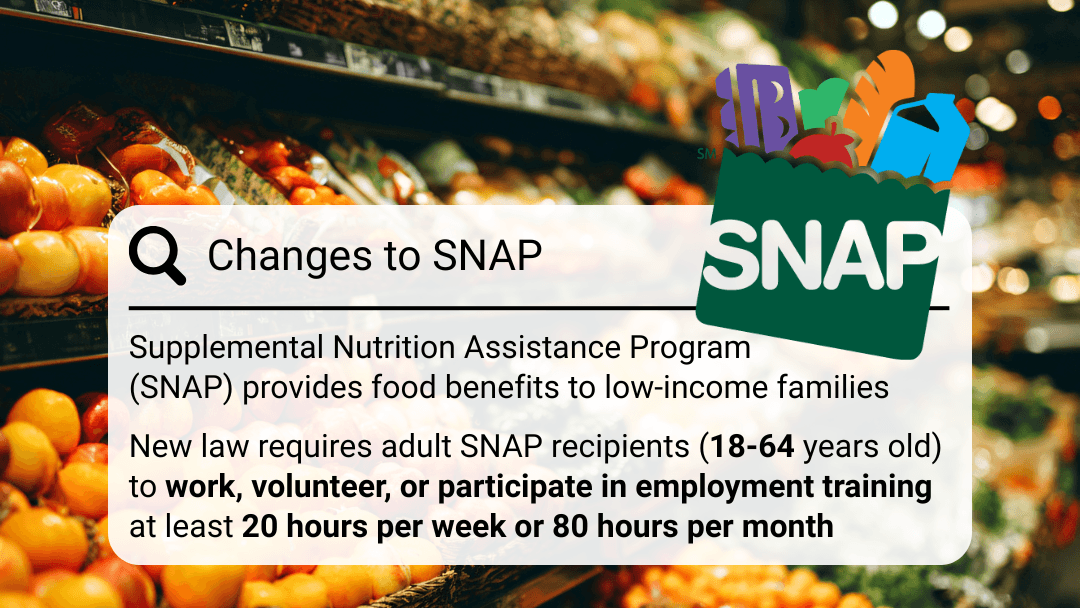
Supplemental Nutrition Assistance Program (SNAP) provides food benefits to low-income families. Recent changes in the law modify who is eligible to receive SNAP benefits and impose new requirements on some applicants. Changes went into effect with bill passage in July, DHHS is implementing as of 10/20/25.
Immigration Status
Who qualifies:
- US Citizens
- LPR/Green card holders
- 5-year residence requirement
- Cuban and Haitian entrants
- Workers authorized to live and work in the US under ‘Compacts of Free Association’ (COFA)
This change goes into effect with initial applications, recertifications, and any time you are required to report changes.
Able-bodied Adults Without Dependents (ABAWDs)
The new law requires adult SNAP recipients (18-64 years old) to work, volunteer, or participate in employment training at least 20 hours per week or 80 hours per month.
If you used to be exempt for one of the following reasons, you do have to meet new work requirements:
- Aged 55 and up: work requirements now apply to adults between 18 and 64
- You have dependent children under 18: work requirements now apply to anyone with no dependents under the age of 14
- Veteran
- Homeless
- Young adult aging out of foster care
You are now exempt and do not have to meet new work requirements if you:
- Are 65+
- Have dependent children under the age of 14
- Are Native American, eligible for Indian Health Services
What has not changed
You may still be exempt and not need to meet the work requirements if you are:
- Responsible for the care of a disabled person or have a dependent under the age of 6
- Minors 15 and under
- Teens aged 16-17 who are not head of household and who are enrolled in school, employment training, or are employed at least half-time
- Students enrolled in high school, college/post-secondary, or training programs at least half-time
- Enrolled in Disability: receiving RSDI, SSI, have a statement from VA showing you are unable to work, Medical Assistance that is disability based, or have a statement from doctor showing you are unable to work, temporary or permanent disability benefits (government or private)
- Employed at least 30 hours per week, earning at least federal minimum wage
- Unemployed: receiving Unemployment Insurance benefits, registered with Workforce Development (if required by UI)
- Enrolled or participating in chemical dependency treatment/rehabilitation
- ADC/Employment first also exempts victims of Domestic Violence: if participation would impair ability to leave an unsafe situation, penalize you, or put you at risk of further violence; you must create a service plan with ADC
There are still other exemptions to the work requirement: you may qualify if you are disabled, primary caretaker for a disabled individual, are currently employed or in school, or meet one of the other exemptions. When you recertify, make sure to talk to DHHS about whether you would qualify for an exemption to the work requirements and what documentation is needed to show you meet the exemption.
Other Program Changes
National School Lunch Program: If SNAP eligibility ends, then automatic eligibility for NSLP also ends. You will have to apply and meet income guidelines:
- Free: 130% of Federal Poverty Level (FPL)
- Reduced: 185% of Federal Poverty Level (FPL)
Standard Utility Allowance: No longer automatically applies if you receive LIHEAP (unless elderly/disabled household), you must now provide information about utility expenses to qualify.




